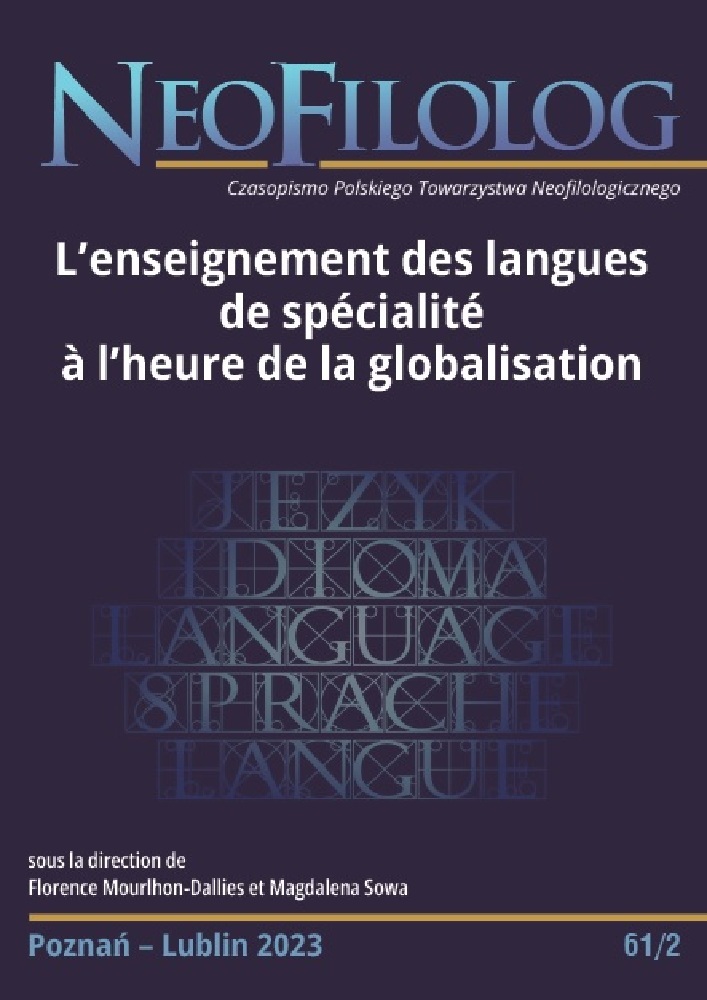Abstrakt
The article examines the ways intercultural aspects are dealt with in textbooks for learning business language (in the broad sense) in French, Spanish and Italian. The authors of the textbooks analyzed represent different approaches, both at the level of the declared learning objectives and at the level of the techniques applied.
Among the textbooks analyzed there are also those oriented towards the development of intercultural skills. Their goal is not so much to prepare the learner to evolve in a given culture, but to make them aware of the differences between their own and the target culture(s)and to be able to mediate between the representatives of each of them. Although in a textbook for the teaching/learning of a foreign language for specialized purposes, intercultural training preparing for “culture shock” must necessarily be limited, the examples observed show that educators aware of the importance of this issue can offer interesting solutions and proposals.
Bibliografia
Bandura E. (2007), Nauczyciel jako mediator kulturowy. Kraków: Tertium.
Bargiela-Chiappini F. (2007), Intercultural Business Discourse, (in:) Candlin Ch. N., Gotti M. (dir.), Intercultural Aspects of Specialized Communication. Bern: Peter Lang, 29–51.
Clyne M. (1994), Inter-cultural Communication at Work: Cultural Values in Discourse. Cambridge: CUP. DOI: https://doi.org/10.1017/CBO9780511620799
Conseil de l’Europe (2001), Cadre européen commun de référence pour les langues : apprendre, enseigner, évaluer. Strasbourg : Didier.
Cuq J.-P., Gruca I. (2003), Cours de didactique du français langue étrangère et seconde. Grenoble : PUG.
Gajewska E. (2011), Préparer à communiquer avec les représentants d’autres cultures professionnels dans le cadre d’un cours de langue sur objectif spécifiques, (in :) Sowa M. (dir.), L’interculturel en pratique. Lublin : Werset, 50–63.
Gajewska E., Sowa M. (2014), LSP, FOS, Fachsprache. Dydaktyka języków specjalistycznych. Lublin : Werset.
Gotti M. (2007), Introduction, (in :) Candlin Ch. N., Gotti M. (dir.), Intercultural Aspects of Specialized Communication. Bern: Peter Lang, 9–25.
Grucza S. (2006), Idiolekt specjalistyczny – idiokultura specjalistyczna – interkulturowość specjalistyczna, (in:) Lewandowski J., Kornacka M., Woźniakowski W. (dir.), Języki specjalistyczne 6: Teksty specjalistyczne w kontekstach międzykulturowych i tłumaczeniach. Warszawa: KJS UW, 30–49.
Isani, S. (2004), Compétence de culture professionnelle : définition, degrés et didactisation. « ASp », no 43–44, 5–21. Online : http://journals.openedition.org/asp/979 [consulté le 09 juin 2023]. DOI: https://doi.org/10.4000/asp.979
Journet N. (2002), La culture. De l’universel au particulier. Paris : Ed. Sciences Humaines.
Kuźma R. (2008), (Nie)obecność treści międzykulturowych we współczesnych podręcznikach do nauki języka angielskiego, (in:) Harbig A.M. (dir.) Nauczanie języków obcych w szkole wyższej. Białystok: Wyd. UwB, 159–170.
Mackiewicz M. (2010), Standardy kulturowe a dydaktyka języków obcych, (in:) Mackiewicz M. (dir.), Kompetencja interkulturowa w teorii i praktyce edukacyjnej. Poznań: Wyd. WSB, 137–149.
Rescia L. (2007), Le Français des Affaires pour le cursus de Mediazione Linguistica : une approche multidimensionnelle et interculturelle. « Synergies Italie », no 3, 32-38.
Saint-Georges I. de (2004), Actions, médiations et interactions : une approche multimodale du travail sur le chantier. « Cahiers de linguistique française », no 26, 320–341.
Sowa M. (2005), Comment développer la compétence interculturelle lors des cours de FLE ? « Roczniki Humanistyczne KUL », no LIII/5, 151–168.
Licencja
Prawa autorskie (c) 2023 Elżbieta Gajewska

Utwór dostępny jest na licencji Creative Commons Uznanie autorstwa – Bez utworów zależnych 4.0 Międzynarodowe.
Przedstawiany utwór (artykuł) upubliczniany jest na podstawie umowy z autorem i na licencji Creative Commons Attribution-NoDerivatives 4.0 International (CC BY-ND 4.0).
Użytkownicy mają obowiązek podania wraz z rozpowszechnionym utworem, informacji o autorstwie, tytule, źródle (odnośniki do oryginalnego utworu, DOI) oraz samej licencji;
- bez tworzenia utworów zależnych,
- utwór musi być zachowany w oryginalnej postaci.
Uniwersytet im. Adama Mickiewicza w Poznaniu zachowuje prawo do czasopisma jako całości (układ, forma graficzna, tytuł, projekt okładki, logo itp.).

